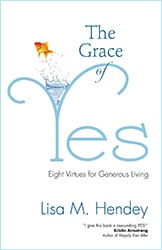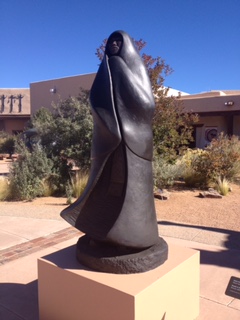 Ellen Painter Dollar is one of my favorite colleagues in the Patheos family of writers. I read what she writes with delight and care, in part because she is from a different part of the country, a different stage of life, a different Christian tradition, with a different vocational goal as a calling. In a post this week she posted a provocative reflection called Why I Don’t Pray and Read the Bible (Much). As I read and re-read Ellen’s post, I wondered how it is that we have such divergent understandings of what a regular prayer and Scripture practice can mean.
Ellen Painter Dollar is one of my favorite colleagues in the Patheos family of writers. I read what she writes with delight and care, in part because she is from a different part of the country, a different stage of life, a different Christian tradition, with a different vocational goal as a calling. In a post this week she posted a provocative reflection called Why I Don’t Pray and Read the Bible (Much). As I read and re-read Ellen’s post, I wondered how it is that we have such divergent understandings of what a regular prayer and Scripture practice can mean.
My history with such a practice is quite different than Ellen’s. My family had daily prayers after breakfast or dinner every day, and each child was encouraged to begin his or her own practice of personal devotions as soon as he or she was of age. As Ellen was, I was involved in college with a group that places a high value and (impossibly!) high standards for a personal “quiet time,” as a a discipline. With that imprinting over many decades of spiritual practice, what happens in those quiet times has changed, morphed, expanded and been re-imagined for me. However, the designation of time and place for prayer and reflection on sacred text has become a home place for me: a place where I can expect to encounter the Holy One; a place where I am given a Word; a place where I can put on a spiritual Sorting Hat to listen and to discern what the Spirit is saying to me in this moment. It is a time–sacred, and space– sacred, in which I am grounded, and it clears the windows of my soul, better to receive and understand the poetry, the art, nature, the newspaper, all the other places where the activity of God is on display.
In my work as pastor, professor and spiritual director, I have encountered many for whom this practice is not useful or compelling. “Don’t make me write a journal!” or “I can’t pray and look at a candle while I am silent,” or “I can’t understand the Bible when I read it alone.” All of these responses have taught me that there are “many ways to kiss the ground,” as Rumi says. I continue my practice of prayer and Scripture reflection because it is a spiritual home for me. I know that by personality I have a deeply contemplative side which is given space and time when I “come apart and rest for awhile.” I also remember that my provenance began before the dawn of social media, of 24 hour news cycles, of instant information, and the shaping of my spiritual practices goes all the way to my beginnings. I invite those with whom I sit to recognize and to name the ways in which they do practice being attentive to the Presence of the Holy One, in themselves, in the Church and in the world. I ask them to explore the practices that do help them know when the Spirit is moving and working. I suggest that trying some practices that are unfamiliar–praying with art, praying with the labyrinth, praying with nature, might open some added dimensions to their relationship and awareness of God’s Presence and action on the world, even a daily time for prayer and reflection.
What I know is that I cannot prescribe a practice for anyone else. If a Quiet Time does not fit, don’t do it. “Pray as you can, not as you can’t.” I also know that I cannot judge the worth or efficacy of another one’s practice. I was a little taken aback when Ellen Painter Dollar closed with her conclusion that her way of paying holy attention was a more useful practice that produced a quality of spirituality than “even the most disciplined and productive quiet time cannot.” I beg to differ.
As followers of the Holy, we are given wide berth in which to soar with the Spirit. From my Reformed tradition we are schooled in paying attention to the Word–in Christ, in sacrament, in Scripture, within us, and in the world. I loved the way that Ellen talked about how she meets the Holy in her life. I know for many of her readers she is lifting a burden laid on by well-meaning, but not so helpful “authorities.” I would hope that there is room for each of us to seek and to find the ways of journeying in faith that fit for us and for our communities. Thanks you, Ellen, for prompting me to think about my own!











